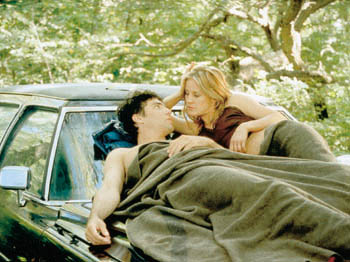![[Metroactive Movies]](/movies/gifs/movies468.gif)
[ Movies Index | Show Times | Silicon Valley | Metroactive Home | Archives ]
Cornhusker
'Tully' is a gentle film from a gentler America
By Richard von Busack
THERE HASN'T BEEN a realistic movie about farm life since A Map of the World, and Tully isn't in that league. No sex, no violence, no rap music here, acclaim the critics, trying to lure an older audience back to the theaters where they've had their senses assaulted so many times. Critics also stress the authentic hard luck the film has had getting out to an audience. It was made two years ago, and two different distributors went bust right before releasing it. Then, at the last minute, it needed a title change from The Trouble With Tully because of The Truth About Charlie; the title change is the source for one very out-of-nowhere reference to Alfred Hitchcock's black comedy The Trouble With Harry.
Wearing its minorness like a laurel wreath, this film by Hilary Birmingham is about the maturing of a young Nebraskan stud who learns to confront his past and his longing for love. Tully Jr. (Anson Mount, a more closed-up version of Billy Crudup) is called a workaholic, but he apparently has a lot of time on his hands to play around and drive his girl-catching '60s car. Naturally, his attitude makes him cross swords with his morose father, Tully Sr. (Bob Burrus). The boy's regular date is a cheap but enticing stripper named April (Catherine Kellner). One day, though, he encounters his brother's pal, the redheaded tomboy Ella (Julianne Nicholson). She's back in town, interning at an animal clinic while studying to be a veterinarian. While she reads Tully like a book--and knows how promiscuous he is--she's still attracted. Meanwhile, the farm is threatened by a mysterious bank lien, which is the result of an unfinished part of the past that's now coming back to haunt the family.
Mostly, though, the film is about good girl Ella vs. bad girl April--and which will Tully choose? I may be oversimplifying it, but not by much. The film is told in such terms. Ella being a veterinary student is old cinematic shorthand in family films: to put it bluntly, it's a way of saying, "This character may act virginal, but at least she knows how it's done." That Tully is frequently banal isn't the fault of the lively, intriguing Nicholson. When she's gone, as she is for much of the picture's second half, the film limps.
Tully takes place in the rolling country near Omaha in the summer, and photographer John Foster's images bring out the beauty. Scenes of Nicholson riding her bicycle during the summer evenings spur that old dumb longing for a little farm out in the sticks. You could sell prairie real estate with this film. Director Birmingham is a former assistant to populist documentary filmmaker Barbara Kopple, so she probably knows that the real Nebraska is less downy. This film provides about as authentic a portrait of Nebraska as TV's Smallville does of Kansas.
Tully exists in that middle ground between realism and studio-made romanticism. It's a sweetened, petty version of Hud, without the compelling bastardry of Paul Newman. What should have been open-ended picture turns up the tears with a tragic but unlikely windfall. Tully is the kind of lukewarm quality film that needs to be called what it is: something neutral enough for a film festival's judges to agree upon.
[ Silicon Valley | Metroactive Home | Archives ]
Copyright © Metro Publishing Inc. Metroactive is affiliated with the Boulevards Network.
For more information about the San Jose/Silicon Valley area, visit sanjose.com.
![]()

Hood Ornaments: Tully (Anson Mount) and April (Catherine Kellner) take advantage of a lazy summer's day.
Tully (Unrated; 102 min.), directed and written by Hilary Birmingham, photographed by John Foster and starring Anson Mount, Julianne Nicholson and Catherine Kellner, opens Friday at the Towne Theater in San Jose.
Send a letter to the editor about this story to letters@metronews.com.
From the November 21-27, 2002 issue of Metro, Silicon Valley's Weekly Newspaper.